Environmental conflict on the agenda of social network
This work is devoted to the analysis of the extent to which the “garbage conflict” in the Russian region has become an agenda setting on the “Vkontakte” social network. The conflict over landfills has become one of the most notable environmental conflicts in Russia in recent years. Media coverage is one of the most important factors in the success or failure of social movements. At present, the presence of their problem on the agenda of not only traditional media, but social networks is playing an increasing role for social movements. The study analyzed the extent to which users of the social network could see the “garbage conflict” in the Arkhangelsk region in various types of communities of the social network "VKontakte". In addition, the ways of disseminating information about the conflict in the social network were analyzed. The method of manual content analysis was used. The analysis showed that during the conflict, protesters actively used the social network VKontakte, creating communities dedicated to the struggle against the construction of landfills. At the same time, the problem of landfills did not turn out to be closed in specialized communities of the social network. However, the analysis showed that the agenda of the “garbage conflict” could not significantly go beyond the territorial communities of the regions directly affected by this problem. At the same time, not only communities, but also the pages of individual users of the social network have become one of the most important ways to disseminate information about the conflict.
Figures
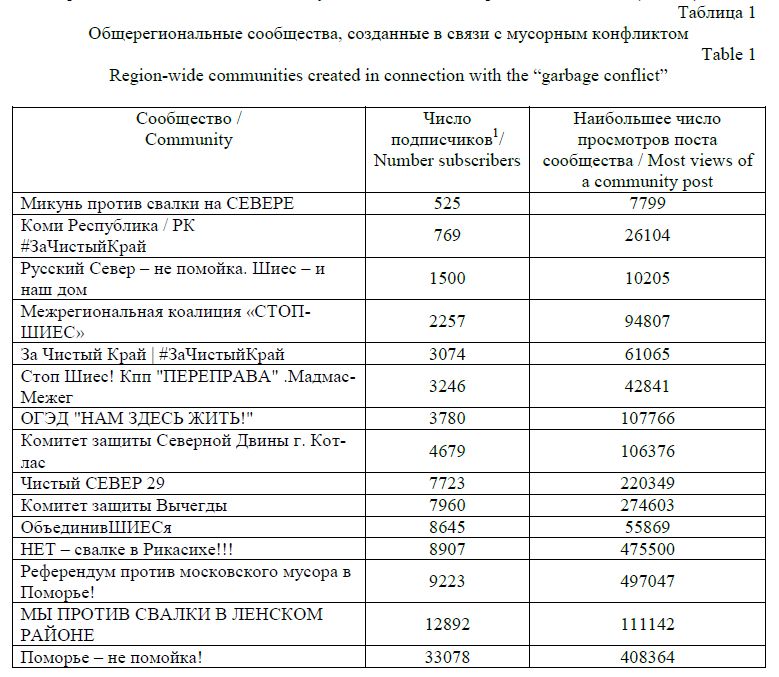
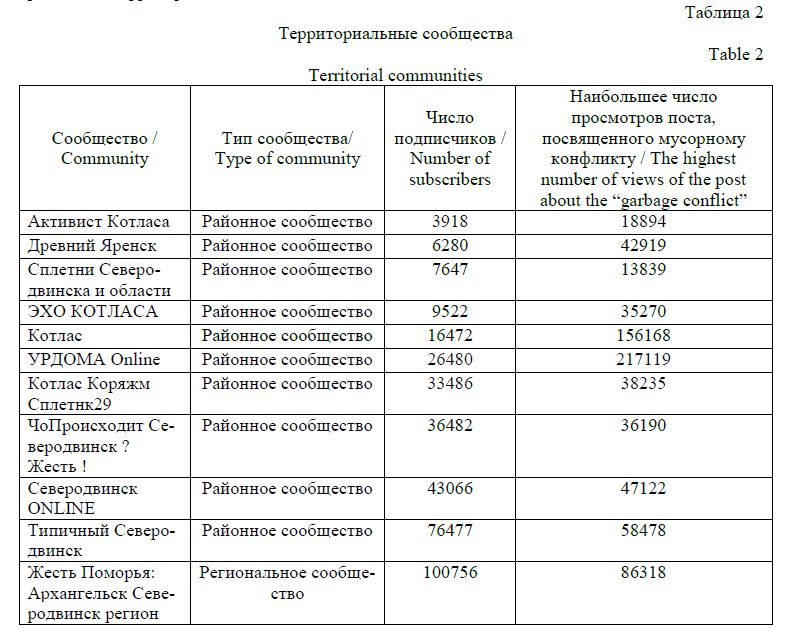
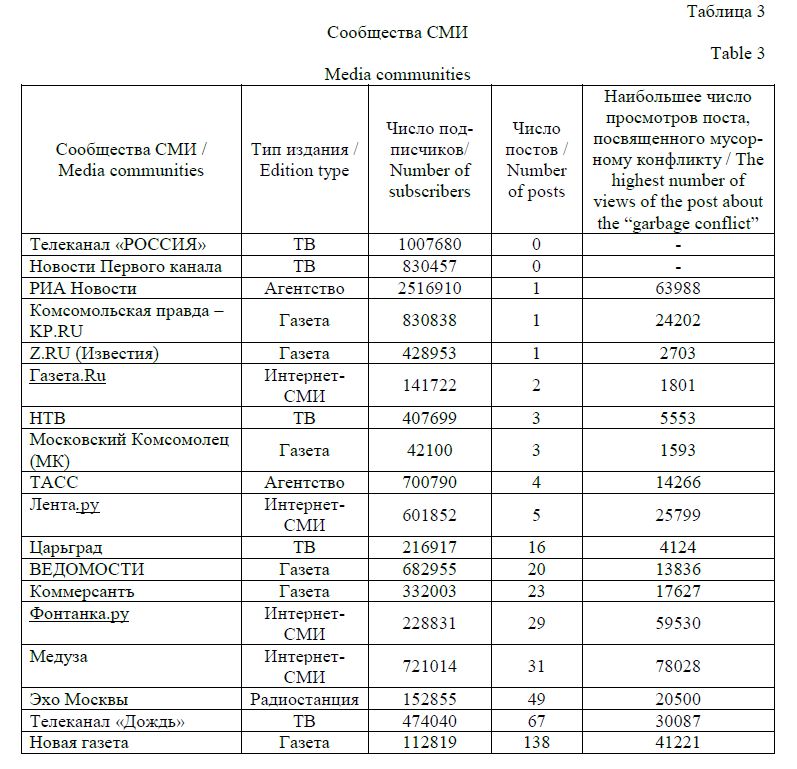
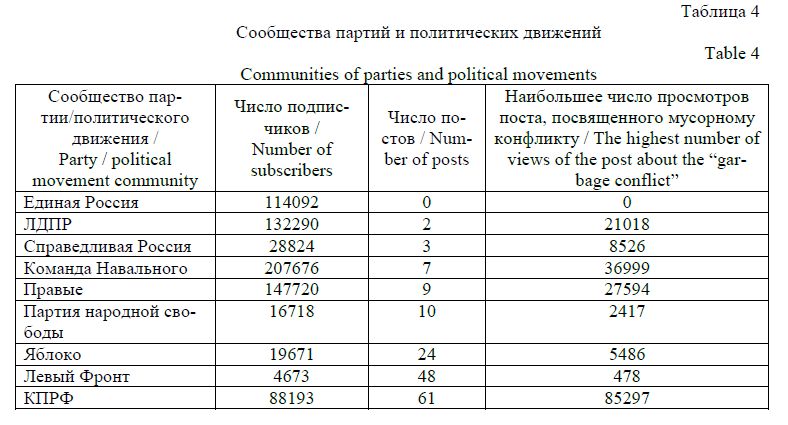
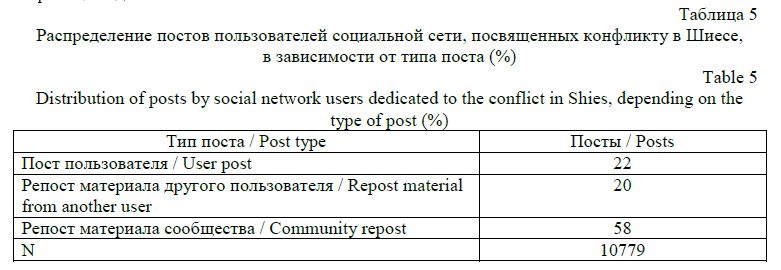
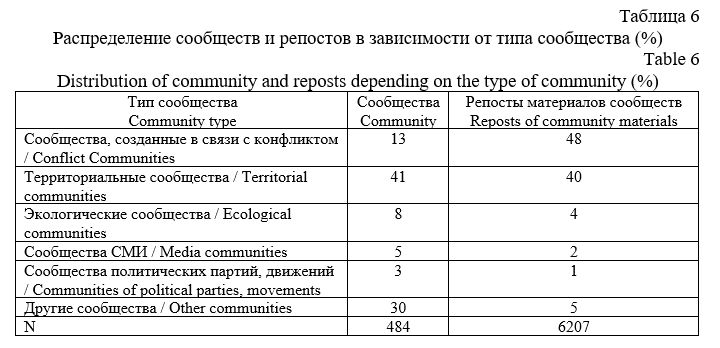
Golbraikh, V. B. (2021), “Environmental conflict on the agenda of social network”, Research Result. Sociology and management, 7 (2), 102-115, DOI: 10.18413/2408-9338-2021-7-2-0-8.


















While nobody left any comments to this publication.
You can be first.
Arkhipova, A. S., Radchenko, D. A., Titkov, A. S., Kozlova, I. V., Yugai, E. F., Belyanin, S. V. and Gavrilova, M. V. (2018), “«Rally rebuild»: Internet in Protest and Protest on the Internet”, Monitoring obshhestvennogo mneniya: Ekonomicheskie i sotsialnye peremeny, (1), 12-35. (In Russian)
Akhremenko, A. S., Stukal, D. K. and Petrov, A. P. (2020), “Network vs Message in Protest Diffusion on Social Media: Theoretical and Data Analytics Perspectives”, Polis. Politicheskie issledovaniya, (2), 73-91. (In Russian)
Golbraikh, V. B. (2020), “Social Networks as a Resource for the Institutionalization of Social Movement (on the Example of the Conflict around Garbage Conflicts in the Arkhangelsk Region)”, Vlast i elity, (1), 183-203. (In Russian)
Golbraikh, V. B. (2019), “Ecoconflicts in Russia and Digital Networks Participation”, Sotsiologicheskie issledovaniya, (6), 74-85. (In Russian)
Zimova, N. S., Fomin, E. V. and Smagina, A. A. (2020), “Social Networks as a New Channel of Interaction Between Government and Society”, Research result. Sociology and Management, (2), 159-171. (In Russian)
Ksenofontova, I. V. (2012), “The Role of the Internet in the Development of Protest Movement”, Monitoring obshchestvennogo mneniya: ehkonomicheskie i socialnye peremeny, (3), 114-116. (In Russian)
Mal'kevich, A. A. (2020), “The Role of Social Media in Protest Political Participation of Citizens”, Upravlencheskoe konsultirovanie, (1), 35-42. (In Russian)
Pivovarov, V. A. (2019), “Features of the Influence of the Internet Communities on the Formation of the Political Agenda in Modern Russia (The Case of Telegram)”, Izvestiya aratovskogo universiteta. Novaya seriyaa. Seriya Sotsiologiya. Politologiya, 1, 113-116. (In Russian)
Platonov, K. A. and Judina, D. I. (2019), “Agenda of Vkontakte Online Protest Communities Based in St Petersburg”, Monitoring of Public Opinion: Economic and Social Changes, (5), 226-249. (In Russian)
Sokolov, A. V. and Palagicheva, A. V. (2020), “Mobilization and Demobilization in a Network Political Protest”, Politicheskaya nauka, (3), 266-297. (In Russian)
Titov, V. V. (2020), “Strategies of Youth Social Protest on the Russian Internet (RuNet): a Comparative Analysis of Generations Y and Z”, Monitoring of Public Opinion: Economic and Social Changes, (3), 139-158. (In Russian)
Tsepilova, O. D. (2002), “Social Movements in the Area of Ecological Disaster: the History of Emergence, Development, Social Consequences (Based on the Example of the City of Kirishi)”, Zhurnal sotsiologii i sotsial'noj antropologii, (1), 61-90. (In Russian)
Tsepilova, O. D. (2019), “The Process of Convergence of Different Social Systems as a Trend of Modernity”, Teleskop: Teleskop: zhurnal sotsiologicheskih i marketingovyh issledovaniy, (2), 20-27. (In Russian)
Chmel, K. Sh., Klimova, A. M., Mitrokhina, E. V. (2020), “The Politicization of Environmental Discourse in the Arkhangelsk Region: the Landfill Siteat Shies Railroad Station”, Zhurnal issledovaniy socialnoy politiki, (1), 83-98. (In Russian)
Asiyanbi, I. (2019), Social Media Activism: Affordances of Social Media Usage in Activism and Social Movement, University of Lapland, Lapland [Online], available at: https://lauda.ulapland.fi/handle/10024/63665 (Accessed 15 December 2020).
Boulianne, S., Koc-Michalska, K. and Bimber, B. (2020), “Mobilizing Media: Comparing TV and Social Media Effects on Protest Mobilization”, Information, Communication & Society, (5) [Online], available at: https://www.tandfonline.com/doi/abs/10.1080/1369118X.2020.1713847 (Accessed 15 October 2020).
Boulianne, S., Koc-Michalska, K. and Bimber, B. (2020), “Right-Wing Populism, Social Media and Echo Chambers in Western Democracies”, New Media & Society, (4), 683-699.
Denisova, A. (2017), “Democracy, Protest and Public Sphere in Russia After the 2011-2012 Anti-government Protests: Digital Media at Stake”, Media, Culture & Society, [Online], available at: https://journals.sagepub.com/doi/full/10.1177/0163443716682075 (Accessed 15 October 2020).
Enikolopov, R., Makarin, A. and Petrova, M. (2020), “Social Media and Protest Participation: Evidence from Russia”, Econometrica, (4), 1479-1514.
Hunt, K. and Gruszczynski, M. (2019), “The Influence of New and Traditional Media Coverage on Public Attention to Social movements: the Case of the Dakota Access Pipeline Protests”, Information, Communication & Society, 1-17, [Online], available at: https://www.tandfonline.com/doi/full/10.1080/1369118X.2019.1670228 (Accessed 15 December 2020).
Koltsova, O. and Bodrunova, S. (2019), “Public Discussion in Russian Social Media: An Introduction”, Media and Communication, 3, 114-118.
Koopmans, R. (2004), “Movements and Media: Selection Processes and Evolutionary Dynamics in the Public Sphere”, Theory and Society, (3/4), 367-391.
Koopmans, R. and Olzak, S. (2004), “Discursive Opportunities and the Evolution of Right-Wing Violence in Germany”, American Journal of Sociology, (1), 198-230.
Lee, F., Chen, H. and Chan, M. (2017), “Social Media Use and University Students’ Participation in a Large-Scale Protest Campaign: The Case of Hong Kong’s Umbrella Movement”, Telematics and Informatics, 2, 457-469.
Lonkila, M., Shpakovskaya, L. and Torchinsky, P. (2021), “Digital Activism in Russia: The Evolution and Forms of Online Participation in an Authoritarian State”, in Gritsenko, D., Wijermars, M., Kopotev, M. (eds.) The Palgrave Handbook of Digital Russia Studies, Palgrave Macmillan, 135-153.
Masip, P., Ruiz-Caballero, C., Suau, J. and Puertas, D. (2020) “Media and Twitter Agendas for Social Mobilizations: The Case of the Protests in Defense of the Public Healthcare System in Spain”, International Journal of Communication, 14, 3355-3376.
McCombs, M. (2014), Setting the Agenda: The Mass Media and Public Opinion, John Wiley & Sons, Cambridge, UK.
McCombs, M. and Shaw, D. (1972), “The Agenda-setting Function of Mass Media”, Public Opinion Quarterly, (2), 176-187.
Toepfl, F. (2018), “From Connective to Collective Action: Internet Elections as a Digital Tool to Centralize and Formalize Protest in Russia”, Information, Communication & Society, (4), 531-547.
Wijermars, M. (2021), “The Digitalization of Russian Politics and Political Participation”, in Gritsenko, D., Wijermars, M., Kopotev, M. (eds.), The Palgrave Handbook of Digital Russia Studies, Palgrave Macmillan, 15-32.